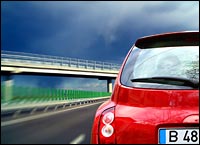This is the second installment of a monthly column on sustainability in the U.K. and Europe, from Peter Madden, chief executive of Forum for the Future, Britain’s leading sustainable development charity. Read the first column here.

We have gone offset-crazy in the U.K. Open any newspaper or magazine at the moment and you’ll see full-page advertisements from oil giant BP offering the chance to “neutralize the impact of your car’s CO2 emissions.”
Buy a new Range Rover, book a holiday with First Choice, or pay for a flight with British Airways and you are given the chance to offset. Even this year’s World Cup declared itself “carbon neutral.”
Government has got in on the act too, with a clutch of departments promising to offset their impacts.
For some environmentalists, though, this is all a dangerous distraction from the need to reduce emissions at source. Kevin Anderson, a climate-change scientist, argues, “Offsetting is a dangerous delaying tactic because it helps us to avoid tackling that task. It helps us to sleep well at night when we shouldn’t sleep well at night.”
Charles Liesenberg, an offset provider, argues the opposite: that because climate change is a global problem, “it doesn’t matter where you reduce emissions, as long as you do it.”
Opinions are polarized. So who is right? We at Forum for the Future had to ask ourselves this question when BP approached us to work with them on designing their customer offset scheme, “targetneutral.”
This led to the kind of debates within our organization that we are seeing across the environmental movement. Some staff were against offsetting, arguing that it encourages guilt-free consumption and doesn’t deflect us from a fossil-fuel trajectory. Others felt that if you accept the ideological case for emissions trading, which we do, you have to accept offsetting.
In the end, we decided to go ahead and do the work with BP. I think that some of the conditions we negotiated with them have wider lessons for how we should handle offsetting.
Offsetting should be the last thing you do, not the first. You have to reduce emissions as much as possible first; then — and only then — offset what you can’t avoid. BP agreed to be clear about this on their targetneutral website. They tell motorists to follow a hierarchy of “reduce, replace, neutralize.” We feel that it is a big step forward for an oil company to be saying that: “Just as every single one of us contributes to emissions every time we turn on our engine, so every single one of us can counter that by reducing the amount we drive, driving more efficiently in more efficient vehicles with better fuels, and neutralising our CO2 fuel emissions.”
It can’t just be about tree-planting. Trees are a risky form of offset, so risky indeed that forest projects are not allowed in the European Union Emissions Trading Scheme. Investments should be in renewable energy and energy efficiency, with additional social benefits where possible. BP is offsetting through biomass energy plants and a wind farm in India, as well as an animal-waste scheme in Mexico.
Offsets need to be properly validated. The global market is booming, currently doubling in size every year. With demand growing so quickly, and with few agreed rules and verification procedures in place, there are clearly opportunities for cowboys, for double-counting and double-selling. You have to make sure that whatever project you’re using to offset your own emissions wouldn’t have happened anyway without your funding. This is crucial to the whole concept of offsetting, but often overlooked. BP, with their international brand and strong expertise in trading, were particularly strict about this. They agreed to have an independent advisory panel oversee the effectiveness and integrity of the project, which we chair.
Handled properly, offsetting can help to increase “carbon literacy.” The BP scheme aims to do so by bringing climate change directly to ordinary motorists on the gas-station forecourt. And through its advertising, it is actively encouraging each of us to think about our personal carbon impacts. Awareness-raising on climate change is important, whether it is done by BP or Pearl Jam. We have also pressed the company to commit to reducing and then offsetting its own carbon emissions.
The targetneutral offset scheme has now been launched and motorists are now signing up. An average British car, driven 10,000 miles in a year, generates approximately 3.5 tonnes of CO2. To offset this amount of carbon emissions costs around $30 a year.
My one big misgiving is that I still think offsetting is too cheap. This sends out entirely the wrong message about climate change. But offsetting does have a role to play — in helping quantify emissions, in adding a value to carbon, and particularly in educating consumers about the carbon consequences of their decisions. So as long as it’s the last resort, then yes, we should offset.



